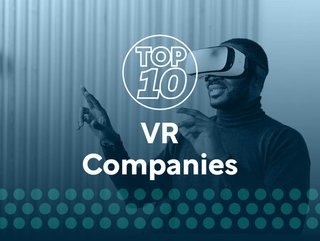
In recent years, virtual and augmented reality (VR/AR) technologies have transformed how we experience the world.
From improving gameplay, to impacting education and healthcare, VR is able to offer the user an advanced perspective to the world. With the industry only continuing to grow, increasing numbers of companies are keen to enter the race to develop new, cutting-edge applications.
With plenty of technology giants seeking to develop their pathways to the metaverse, AI Magazine considers some of the leading enterprises in the industry who are committed to blending physical reality with virtual experiences.
10. HTC
HTC Corporation is a Taiwanese consumer electronics company headquartered in Xindian District, New Taipei City, Taiwan. Founded in 1997, the company started as an original design manufacturer and original equipment manufacturer that designed and manufactured laptop computers - before moving onto smart handheld devices.
The company currently offers HTC Vive - a line of virtual and mixed reality headsets that are designed for use with personal computers, as well as standalone headsets such as the Vive Focus line, Vive Flow glasses and the Vive Elite XR mixed reality headset.
9. Amazon
Whilst Amazon does not sell its own headset, it offers a wide range of online shopping options for customers to purchase mobile phone virtual reality headsets and 3D wireless headsets.
Currently, the company offers a suite of VR/AR and 3D shopping experiences designed to bring products to life, in addition to enabling customers to interactively engage with evaluate items. Customers are able to see product details in 3D from any angle - which has increased the company’s engagement, with more than 80% of customers likely to use the experience again.
8. Unity Technologies
Unity by Unity Technologies provides powerful tools to make rich and deeply engaging VR/AR experiences that intelligently interact with the real world. It has custom resources and an industry-leading software development platform that pairs tools purpose-built for creators. It is used across a range of industries, including automotive, manufacturing, government, architecture, energy and retail.
In addition, its unified workflow extends across devices to allow the user to focus on pushing the boundaries of their imagination. Unity’s AR Foundation is a cross-platform framework that allows the user to write AR experiences and build for either Android or iOS devices.
7. Sony
Sony offers a PlayStation VR headset for more immersive gaming experiences, as it hopes to offer 360-degree vision and 3D audio. The PlayStation Camera is able to track the position of the headset from every angle, with the company also selling varied controllers to optimise the gaming experience.
In January 2024, Sony hinted at possible future developments, teasing a Spatial Content Creation System - consisting of a ‘spatial’ VR headset with a smart control ring. The company announced that it would be partnering exclusively with Siemens using software from the Siemens Xcelerator open digital business platform.
6. Qualcomm
Qualcomm Technologies aims to accelerate the future of extended reality (XR) with its Snapdragon XR technologies. It is designed to seamlessly merge the physical world with digital, with solutions that include processors, software and perception technologies, reference designs and developer tools.
The technology aims to combine high performance and low power computing, 5G and AI, in addition to XR, which it has designed to make maximum global impact. Qualcomm also has The Snapdragon Metaverse Fund that aims to invest up to US$100m in XR developers and companies to support immersive XR digital experiences.
5. Google
Google has already ventured into the virtual reality race, having created several VR and AR products such as Google Glass, Google Cardboard and the Daydream VR headset. Google has also developed ARCore, a platform for creating augmented reality applications on Android devices. The company is continually focused on developing and enhancing immersive technologies that allow users to experience new and customisable virtual environments.
It has been suggested that Google metaverse Project Starline may play a key role in further connecting people online. Individuals should be able to come together and join this metaverse to interact and collaborate on projects and share ideas.
4. NVIDIA
NVIDIA solutions, including the NVIDIA XR Suite, use its RTX GPUs and RTX Virtual Workstation (vWS) to enable extended reality (XR) applications to Android and iOS devices. In particular, its CloudXR platform works to maximise quality and frame rates to power next-level VR/AR experiences.
CloudXR allows the user to stream stunning VR/AR experiences from any OpenVR application. Users can also run VR/AR experiences from a remote server across 5G and WiFi networks to any device, while embracing the freedom to move without wires.
3. Apple
Apple’s first venture into the headset market, Apple Vision Pro, is now available (as of February 2024), marking the tech giant’s first entry into the spatial computing market. With fast-paced developments in machine learning, computer vision and other new technologies, spatial computing could be positioned to dominate the industrial landscape over the next decade.
The Vision Pro headset is Apple's most expensive product since the launch of the iPhone more than a decade ago, currently retailing at US$3,499 in the US. It also marks the launch of Apple’s first 3D camera.
2. Microsoft
As a leading figure in the technology space, Microsoft has a range of VR headsets and accessories on offer in its shop. Its VR gaming systems are powered by NVIDIA graphics and can offer a dedicated memory that delivers smooth, ultra-fast performance for the latest VR games, in addition to movies and videos.
In addition, it offers Microsoft HoloLens, which delivers a ‘mixed reality’ experience, with the use of holographic images that appear to interact with the real world. However, the company has announced that Windows Mixed Reality will be discontinued from 2026/27.
1. Meta
In recent years, Meta has been keen to shift towards digital extensions of the physical world via social media, virtual reality and augmented reality (VR/AR).
Meta is now one of the leading companies that utilises AI in the metaverse and offers information services on VR, AR and smart glasses. The most significant of these offerings is the Reality Labs’ Meta Quest 3 headset has been hailed as a real triumph for the future of VR, facilitating a greater blend between actual and virtual reality, from gaming to education.
Among other use cases, Meta believes that the metaverse will work to transform crucial industries worldwide, including education, healthcare, mechanics and engineering, to name a few.
******
Make sure you check out the latest edition of AI Magazine and also sign up to our global conference series - Tech & AI LIVE 2024
******
AI Magazine is a BizClik brand






